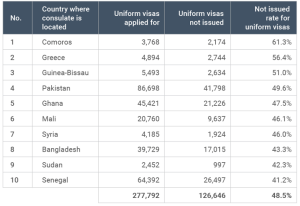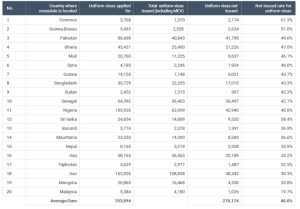This critical reflection examines the persistent disparities in Schengen visa rejection rates for African nationals within the broader context of international mobility and border governance. Despite a decline in global applications, African submissions have risen, yet face significantly higher refusal rates than other regions. Drawing on international relations (IR) theories, among some of them (1) structural realism, (2) constructivism, and (3) critical migration theory, this piece of reflection argues that Schengen visa regimes act as instruments of geopolitical stratification. It presents empirical evidence to show that rejection rates are shaped not just by economic indicators or migration risks, but also by identity politics, postcolonial legacies, and the discretionary power of visa officers. It reviews the contradictions in EU migration policy, particularly the gap between its professed commitment to legal migration and the barriers erected against African applicants. It concludes with a call to reframe mobility as a human right and for reforms that democratize global mobility governance.
Introduction
Visa regimes have become increasingly central to the governance of global mobility. The Schengen system, ostensibly designed to streamline short-term travel to European Union (EU) member states, functions in practice as a gatekeeping mechanism that disproportionately disadvantages certain nationalities, particularly Africans. Despite compliance with formal application requirements, African nationals continue to face systemic barriers. In 2023, the average rejection rate for African applicants was 27%, 11 percentage points higher than the global average (Henley & Partners, 2025). These disparities are not merely administrative anomalies; they reflect deeply embedded geopolitical and ideological hierarchies. This critical reflection situates visa governance within broader debates in international relations, highlighting how border regimes reflect both traditional security concerns such as territorial sovereignty and demographic control, and evolving paradigms like human security, which emphasize dignity, mobility rights, and equitable treatment across national boundaries. This critical reflection applies core IR theoretical frameworks to interrogate the rationale, implications, and structural nature of these inequalities.
Theoretical Foundations: Explaining Visa Inequality through IR Lenses”
To understand the deep-rooted disparities in Schengen visa rejections for African nationals, it is essential to situate the issue within the theoretical frameworks offered by IR. The following subsections explore three distinct but complementary IR approaches: structural realism, constructivism, and critical migration theory, which help explain how global mobility is governed, restricted, and racialized.
- Structural Realism and Strategic Border Control
From the standpoint of structural realism, particularly the neorealist variant, States prioritize national security and sovereignty above all else (Waltz, 1979). Visa regimes are thus conceptualized as mechanisms through which states filter entry, not just to mitigate immediate threats, but also to preserve systemic power structures. African applicants, often perceived through stereotypical lenses as economic migrants or irregular migration risks, are subjected to stringent scrutiny and high refusal rates. This securitization aligns with the realist principle of an anarchic international system, where cooperation is limited and state behavior is guided by strategic self-interest.
Schengen visa policies, then, are not merely administrative exercises but tools of strategic exclusion. They reflect an international order where mobility is unequally distributed based on perceived threats to the economic and social stability of destination states. The sustained rejection of African applicants illustrates a form of preemptive containment, where states exercise control over mobility flows to maintain internal equilibrium and external dominance.
- Constructivist Insights into European Identity and African Exclusion
Constructivism, in contrast, emphasizes the socially constructed nature of international politics. States do not merely respond to material threats; their behavior is shaped by norms, ideas, and identities (Wendt, 1999). Within this framework, visa decisions are understood as deeply embedded in narratives about who belongs and who does not. The high rejection rates for African applicants are linked not just to socioeconomic indicators, but to entrenched Eurocentric imaginaries of Africa as a continent plagued by instability, poverty, and unwanted migration.
These identity constructions influence the discretionary power of consular officers, who assess applicants not solely on objective criteria, but also on subjective judgments informed by racial, national, and class-based assumptions. Thus, visa regimes act as symbolic borders that reinforce who is seen as a legitimate traveler and who is presumed to be a security or economic liability. In this light, Schengen policies are expressions of a constructed European identity that necessitates the exclusion of African ‘Others.’
- Critical Migration Theory and the Racialization of Visa Control
Critical migration theory deepens this analysis by conceptualizing borders not as static lines but as dynamic instruments of racialized control. Drawing from postcolonial theory, scholars argue that modern visa regimes reproduce colonial hierarchies under the guise of legal-rational bureaucracy (Mezzadra & De Genova, 2013). The term “mobility apartheid” has been used to describe this phenomenon, where access to mobility is stratified by race, geography, and political relations.
In the Schengen context, the visa regime operates as a racialized filter, disproportionately restricting African mobility while granting easier access to applicants from wealthier, predominantly white nations. This structural bias is maintained through policies such as visa sanctions on non-cooperating states, heightened documentary requirements, and the discretionary powers of consulates. These practices obscure their discriminatory effects behind formal legalism, yet perpetuate material inequalities in who can move freely and who cannot.
- Empirical Disparities in Rejection Rates
The empirical evidence supports the theoretical claims outlined above. According to the Henley Global Mobility Report (2025), six of the top ten countries with the highest Schengen visa rejection rates in 2023 were African: Comoros (61.3%), Guinea-Bissau (51%), Ghana (47.5%), Mali (46.1%), Sudan (42.3%), and Senegal (41.2%). These countries represented only 2.8% of global applications but accounted for a disproportionate share of rejections. In contrast, Asia, which submitted over twice as many applications, experienced a rejection rate nearly half that of Africa (Henley & Partners, 2025).
World Top 10 Countries with Highest Schengen Visa Rejection Rates in 2023

Source: Data compiled by Prof. Mehari Taddele Maru, the author of “Schengen Visa Discrimination in Numbers”, from the EU Commission – Migration & Home Affairs, May 2024
Moreover, the rejection gap between African and Asian applicants has widened over the last decade. In 2013, the difference was 12 percentage points; by 2023, it had risen to 14. Such trends contradict the logic of economic rationality, especially considering that the EU remains Africa’s top trading partner and a key development interlocutor (Afreximbank & IMF, 2024).
Even countries with robust diplomatic and economic ties to Europe face high rejection rates. The UAE, for instance, had a rejection rate of 22.8% a figure driven by applications from non-citizen residents, including African and South Asian nationals. This example underscores how visa rejections are not strictly correlated with state wealth but are mediated by applicant identity and status (Henley & Partners, 2025).
Top 20 African and Asian Countries with the Highest Schengen Visa Rejection Rates in 2023 by Percentage

According to the source, data compiled by Prof. Mehari Taddele Maru from the EU Commission – Migration & Home Affairs (May 2024) and the top 20 countries in Africa and Asia, submitted a total of 703,894 applications, representing 6.8% of all Schengen visa applications, of which 40% were rejected.
- Challenging Liberal Assumptions: Afar from Economics
Classical liberal theories of international relations posit that increased economic interdependence leads to greater cooperation and openness. Visa regimes, under this model, should reflect mutual economic interests and reciprocity. However, the persistent exclusion of African nationals challenges these assumptions. Despite extensive trade, development cooperation, and diaspora networks, African mobility to Europe remains tightly restricted. Liberalism, in this context, proves inadequate in accounting for the identity-driven, racialized, and securitized dimensions of mobility governance that are more effectively captured by critical and constructivist approaches.
Migration theories such as the Gravity Model (Stewart, 1948) and migration network theory (Massey et al., 1993) predict high levels of movement between Europe and Africa due to proximity, historic ties, and existing social capital. Yet, the data reveal the opposite. Legal mobility is obstructed, suggesting that non-material factors such as racialized perceptions and identity politics play a more decisive role than liberalism accounts for.
The contradiction between European policy rhetoric and practice is most evident in the Africa–EU Partnership on Migration and Mobility. While the EU officially promotes legal migration pathways and people-to-people exchange, its visa regime enforces the opposite. Visa fees increased by 50% from €60 to €90, even as rejection rates rose and application numbers declined globally (European Commission, 2024).
These contradictions can be partly explained by domestic political dynamics. As the constructivist theory emphasizes, national policies are often shaped by internal identity debates. The rise of right-wing, anti-immigration parties in Europe has pushed governments to adopt restrictive visa measures to appease electoral constituencies. African mobility becomes a casualty of this politicization, sacrificed for perceived national cohesion and political gain.
Implications for Mobility Justice and Global Governance
Visa inequality has far-reaching implications beyond immediate travel barriers. It limits African participation in international forums, academic collaboration, cultural exchange, and transnational business. It also undermines the principle of equal partnership that undergirds Africa–EU relations. A mobility justice perspective calls for the recognition of movement as a fundamental right, not a privilege granted by powerful States. Addressing visa discrimination requires dismantling the racialized structures embedded in current regimes and democratizing the processes of mobility governance. This includes decentralizing consular decision-making, enhancing transparency, and embedding accountability mechanisms.
Conclusion
The Schengen visa regime exemplifies how global mobility is governed by unequal power relations rooted in security logics, identity constructions, and postcolonial legacies. Through the lenses of structural realism, constructivism, and critical migration theory, it becomes clear that African mobility restrictions are not accidental but structurally embedded. Moving toward a more just mobility regime requires both theoretical and institutional transformation, one that centers equity, rights, and multilateral cooperation.
Disclaimer
This critical reflection is a purely academic exercise aimed at analyzing global mobility disparities through established IR theories and publicly available data. It is not intended to target or offend any government, institution, or individual. The author acknowledges the complexity of migration governance and respects the sovereign right of States to manage their borders. Any unintended offense that may be caused by this analysis is sincerely regretted.

